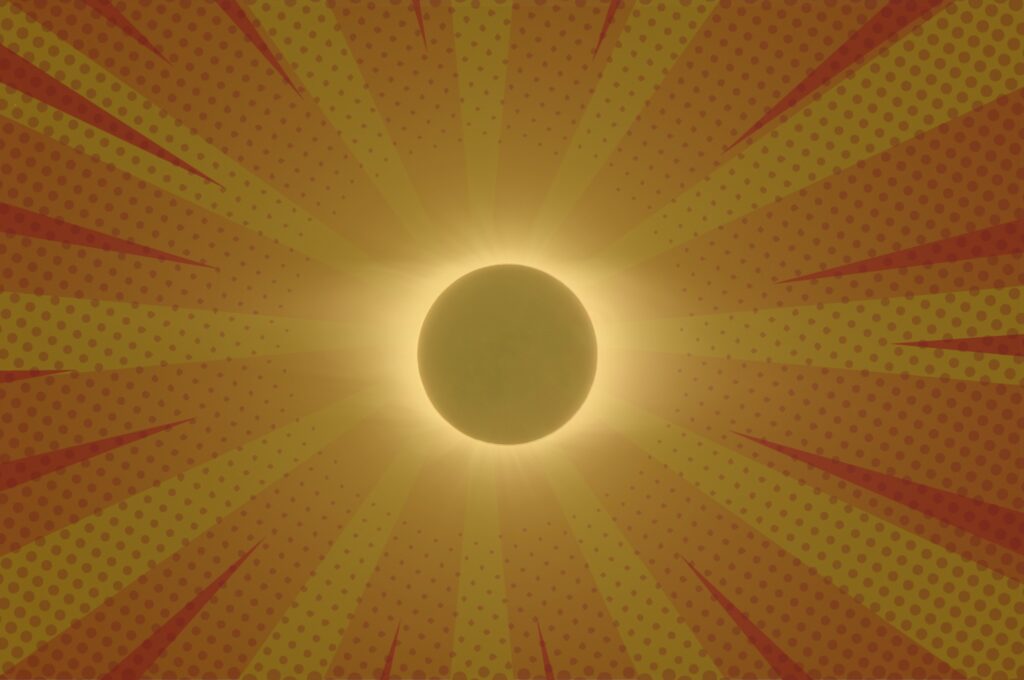A Total Eclipse of the Heat
The eclipse mania gripping U.S. media and the entire nation is an opportunity to gaze in awe at the climate crisis we’ve unleashed and talk about our collective response.

Millions of Americans traveled this week to the path of totality to hunker down with loved ones and total strangers to gaze upwards at one of the most amazing astronomical events of our lives and share something like a transcendent, spiritual experience. I hope we can collectively reckon with another terrifyingly awesome atmospheric event: the hottest year.
Multiple relentless heat waves occurred in 2023, with much of the globe experiencing 20 more “heatwave days” than in the previous three decades. The annual-average temperature was 1.48 C above the pre-industrial average, just shy of the 1.5 target set by the Paris Agreement – and an astonishing 0.17 C hotter than the second-hottest year to date, 2016. Last month the trend continued: March was the hottest on record—the tenth month to break records. If last year was a shocker, this year will be a powerful confirmation.
Much has been said and written about how this total eclipse can connect us. Much less has been said about what this total eclipse reveals about humanity’s shared experience on a warming planet that we’re making dangerously inhospitable.
Here’s just a couple examples of the missed opportunity. In a piece titled “These scientists think an ‘awe’-some eclipse could help unite Americans in troubled times,” the Los Angeles Times talked to scientists about how this kind of communing with nature can affect our brains and our relationships to one another. Awe, we are told in the story, “gives you a sense of feeling connected to something bigger than yourself, like your community, your society or your world… Getting people to feel that way is totally vital to our species’ survival and longevity.” If you think the author drew any obvious connection here to the climate crisis, you’d be wrong. The story instead asked if staring at the sky would unite Americans divided by… the presidential race.
The New York Times similarly dug deep for this Sunday edition A1 story that explored what awe-inspiring phenomena can do for humanity, starting with a look at the origins of the word “awe” (stemming from early Scandinavian [language] around the 12th century, meaning “fear, terror, dread,” at times mixed with reverence in relation to God or the divine.”) Given the crass commercialism around this eclipse, it’s great to be reminded of the slightly terrifying nature of watching the sun dim to black while animals freak out. And yet there’s no mention of the obvious source of fear, terror, and dread in 2024 when it comes to planet earth. “All sentient creatures are going to experience this, even non sentient creatures,” one professor told the New York Times about the eclipse. Read out of context, that description fits climate change too, of course. The total eclipse “is a chance to connect the dots we don’t normally get to,” the Times quotes another researcher as saying.
Why on earth couldn’t journalists be bothered to connect the dots here? The connections are painfully obvious and important.
For starters, we are witnessing the extreme reliability and precision of science and scientists. Millions of us hopped planes, booked expensive AirBnBs, and made all sorts of detailed plans to be in exactly the place that scientists told them to be months ago. “So why do so many ignore scientists’ predictions about climate change?!!” as one writer put it on X. Communities from Texas to Ohio that are benefiting from this scientifically informed tourism boom are the same places where some people like to question and mock climate scientists. There’s a lesson here.
We are also witnessing the awesome power of the star at the center of our solar system. Anyone in the path of totality can tell you about the drastic drop in temperature of 5 to 15 degrees, underlining the blessing and curse that is the sun’s heating. Not to mention the eerie change in wind patterns and even thunderstorms that follow, reminding us of the earth’s complex weather systems. Thanks to that drop in temperature, winds weaken and even reverse course before gaining strength as the sun remerges. What magic.
The eclipse is also a teachable moment for what is, and is not, causing climate change. As NASA points out on X, the temperature drop gives “a firsthand sense that the sun is a major part of Earth’s climate system. But that doesn’t mean the sun is causing climate change.” The NASA account continued that “any significant change in the amount of solar radiation reaching Earth can change the climate” though it stopped short of naming humans—and a few handfuls of large corporate emitters—as the culprit.
One person who is drawing this connection is Bill Nye. The science guy has been doing interviews about how the eclipse is a moment of reflection on the importance of science and its warning about burning fossil fuels. “For me, this total solar eclipse is part of the celebration of the process of science and our understanding of the cosmos and our place within it,” he said in an interview ahead of appearing in Texas for the eclipse. It’s absolutely possible to be thrilled by this awe-inspiring, trippy experience of nature while still drawing some sober connections to the global heating that is putting it all at risk.
We are witnessing the awesome power of the sun, a major part of earth’s thermostat, to sustain or kill us depending on how we tinker with our planet. And right now, we are cranking the thermostat way too high. When New Year’s Eve 2024 rolls around, will we mark this event with anything akin to the buzz of the total eclipse? Because while some 40 million people live in the path of totality, when it comes to the climate crisis approximately 8.1 billion of us live in the path of fatality.







Reader Comments